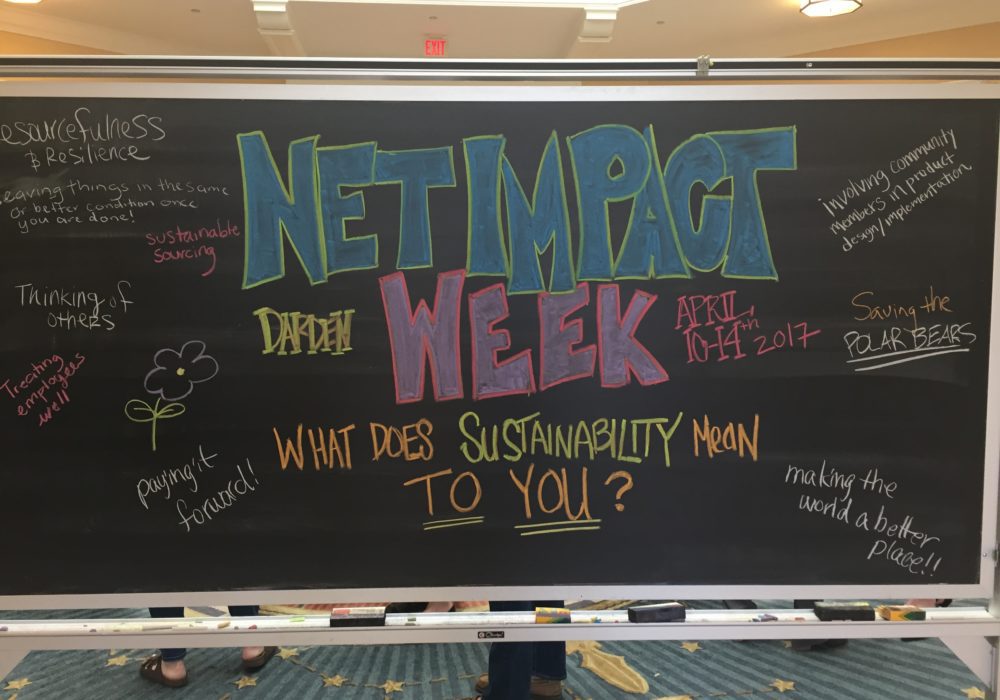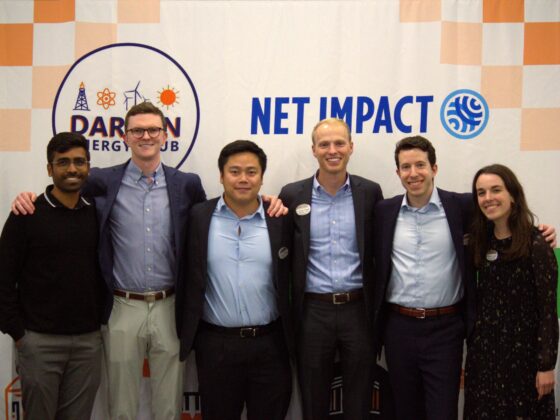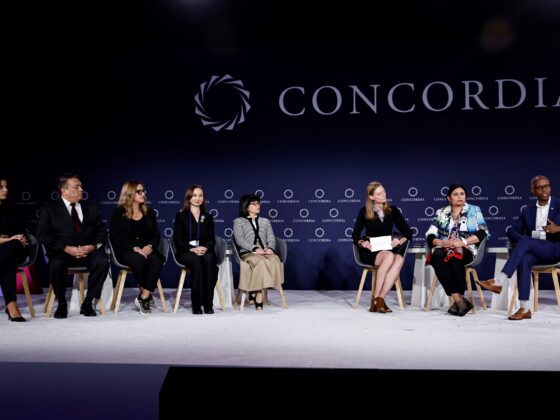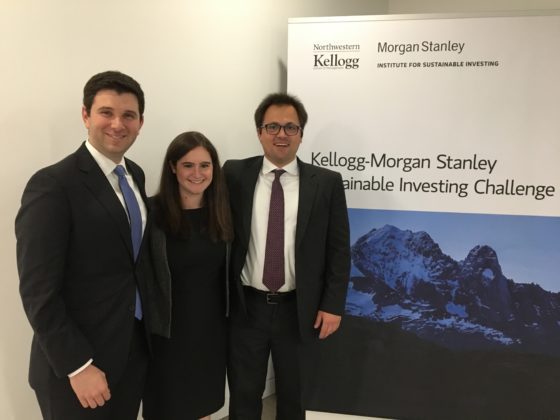By Alice Cassin and Shilpa Muralidaran
How can we use business as a force for good? That was the question posed to the University of Virginia Darden School of Business community during Net Impact Week, held this April.
Events throughout the week inspired conversations around how public, private and nonprofit organizations are generating positive change through business. The Net Impact at Darden student club organized the week in partnership with the Institute for Business in Society, the Global Business and Culture Club, Darden Business & Public Policy Club, the Office of Student Affairs, the Center for Global Initiatives, Darden Wine & Cuisine Club, Darden Energy Club, the Adam Smith Society, Darden Impact Ventures and the Center for Asset Management.
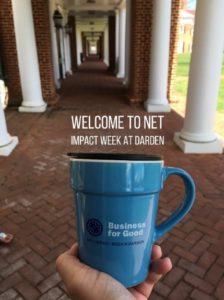 Net Impact Week kicked off with a sustainability-themed First Coffee, building on a Darden networking tradition that brings together students and professors each morning between classes. At the event, the Net Impact club distributed coffee mugs made by Fairware, a Canadian B Corporation that focuses on ethical sourcing, sustainable materials and processes and corporate citizenship. The event was co-sponsored by KIND, a snack food company that claims to be run by “a group of socially-conscious health nuts.” At the event, Net Impact members displayed quotes by KIND CEO Daniel Lubetzky to demonstrate the challenges and benefits of running a “not-only-for-profit” business. Students participated by writing their answers to the question “What does sustainability mean to you?” on a large chalkboard. Responses included “environmental stewardship” and “employee ownership,” among others.
Net Impact Week kicked off with a sustainability-themed First Coffee, building on a Darden networking tradition that brings together students and professors each morning between classes. At the event, the Net Impact club distributed coffee mugs made by Fairware, a Canadian B Corporation that focuses on ethical sourcing, sustainable materials and processes and corporate citizenship. The event was co-sponsored by KIND, a snack food company that claims to be run by “a group of socially-conscious health nuts.” At the event, Net Impact members displayed quotes by KIND CEO Daniel Lubetzky to demonstrate the challenges and benefits of running a “not-only-for-profit” business. Students participated by writing their answers to the question “What does sustainability mean to you?” on a large chalkboard. Responses included “environmental stewardship” and “employee ownership,” among others.
Keynote speaker Rebecca van Bergen, the Founder and Executive Director of Nest, inspired students with her entrepreneurial story of starting a nonprofit that empowers global artisans and homeworkers through supply chain transparency, sustainable business development and industry advocacy. She described how Nest’s work alleviates poverty, strengthens social protections for artisans and preserves traditional crafts. Her organization works with well-known brands to create a visible, regulated and transparent supply chain while empowering artisans in 50 countries. Van Bergen’s keynote culminated in a call to action, as she encouraged MBA students to get involved with NEST through its new fellowship program.
Net Impact Week also featured the Impact Investing Forum hosted by Darden Impact Venture and Darden’s Richard A. Mayo Center for Asset Management. Darden students were thrilled to hear from high profile, knowledgeable panelists including Alex Fife (MBA ‘14) of Village Capital, Eric Letsinger of Quantified Ventures, Rodney Willett of Impact Makers and Garrett Wilson (MBA ’14) of Hirtle, Callaghan & Co . The panelists provided an overview of the impact investing industry, highlighting recent trends in growth and sophistication of investment vehicles as well as innovative ways the industry is pursuing and evaluating social impact.
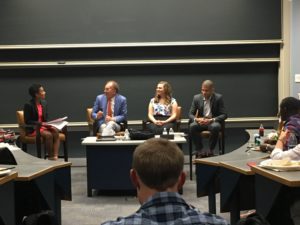
To explore how business can spur much-needed economic growth in Middle America, Net Impact Week delivered a fascinating mid-week panel called “The Entrepreneurial Renaissance in America’s Heartland,” sponsored by the Institute for Business in Society. Distinguished panelists included Antoine Van Agtmael, senior advisor at Foreign Policy Analytics and co-author of The Smartest Places on Earth; David A. Williams, senior advisor to Detroit Mayor Mike Duggan and a graduate of Harvard Law School; and Elise Miller Hoffman, a principal at Cultivation Capital, a venture capital firm based in St. Louis. The panelists described how investments in entrepreneurship and business are injecting new life into Midwest economies, and engaged with audience members on how business has and will continue to impact racial and social justice issues. The discussion centered on the role of business in providing new economic opportunities to marginalized populations, including urban minorities, rural populations and blue collar workers who have experienced job losses due to the rise of automation and increasing global competition from trade.
“We need our cities to adapt, otherwise they will die,” said Williams, citing the vibrancy business has brought back to Detroit following the financial crisis. “We are asking ourselves, how can we make Detroit the mobility capital of the world?” The panelists urged the audience to consider job opportunities in Middle America, citing demand for business skills in the region, and demonstrating opportunities for recent graduates to have a significant impact on these communities.
Miller urged students to consider non-traditional career paths. “Think about your retirement party,” she said. “What legacy do you want to leave?”
Another timely event that drew a wide-ranging audience was the panel on the Flint water crisis co-sponsored by World Water at UVA, Institute for Business in Society and Net Impact at Darden. Led by Professor Peter Debaere, an expert on water markets, the event focused on issues of water quality, infrastructure and social justice that surfaced during and after the public health crisis in Flint, Michigan, when city leadership decided to shift the source of its drinking water without having adequate water treatment and decontamination. Professor Amy Pruden, who co-led the Virginia Tech team that uncovered Flint’s lead problems, described the ongoing challenges faced by Flint residents and their city’s leadership and discussed remedies and safeguards for the future. Ruffner Page (MBA ’86), Darden alumnus and CEO and President of water infrastructure multinational organization McWane, shared his perspective on remaining water-related issues in Flint and throughout the country, including aging infrastructure. UVA Law Professor Cale Jaffe outlined the legal and regulatory framework that defines our water infrastructure and use.
Alongside the week’s captivating panels and speakers, Net Impact Week brought the Darden and UVA community together for social activities including a Sunset Yoga Session with FlyDog Yoga and the Global Impact Cold Call. Both events were co-hosted with the Global Business and Culture Club. The Cold Call featured global cuisine and was supported by the International Rescue Committee (IRC). A local IRC member was on hand to draw attention to the refugee crisis and to promote the newly established GenR program, targeted at young professionals who want to make a difference in the lives of refugees.
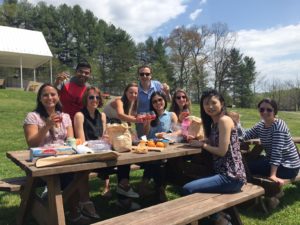
Net Impact Week closed out with a “Sustainability Wine Tour” co-sponsored by Net Impact at Darden and the Darden Wine and Cuisine Club. Students spent the afternoon at Loving Cup Vineyard and Winery learning about the business of organic farming, not to mention drinking great wine!
About the Authors: Alice Cassin and Shilpa Muralidaran are Darden School MBA students. They serve as the outgoing (Cassin) and incoming (Muralidaran) Vice Presidents of Darden’s Net Impact Club.

